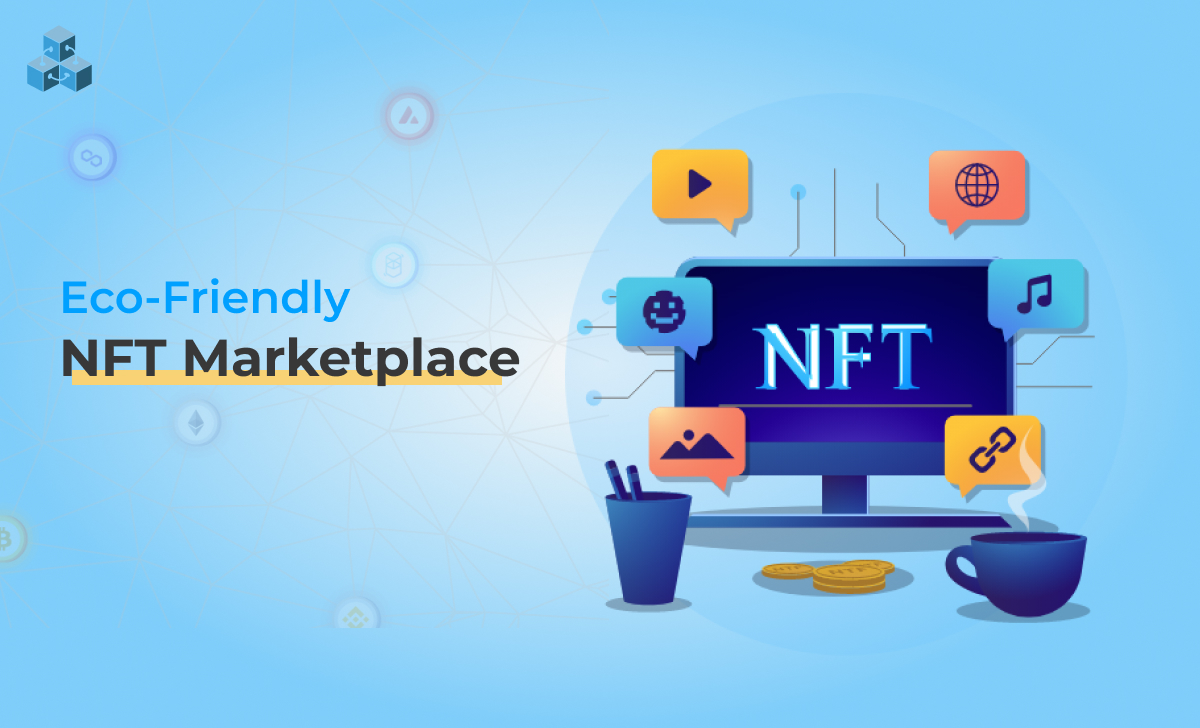The NFT community has continued to take the digital world by storm and revolutionize the standard ways of buying, selling, and trading. Artists, creators, and creators are streaming as a part of this transformative trend. While NFTs are bringing exciting opportunities for digital assets as in ownership, they are also facing criticism for the environmental impact it is causing. Join the eco-friendly NFT marketplace that aims to reduce the effect of NFTs and promote a digital future.
In this blog, we will examine the concerns associated with traditional NFTs and discuss how eco-friendly NFT marketplaces are playing their role in greening the digital canvas while minimizing the carbon footprint.
Understanding the NFT Boom
Non-fungible tokens are unique digital tokens representing ownership or proof of authenticity for digital assets, such as art, music, videos, and virtual real estate in a virtual world. The ownership of digital assets, including NFT records on a blockchain, is a decentralized digital ledger platform that ensures each token is unique and rare. The attraction of NFT is its ability to grant digital assets value and open up new opportunities for creators, collectors, and investors in the digital ecosystem. However, the blockchain technology used for creating and trading NFTs is under scrutiny based on its energy consumption and carbon emissions.
The Environmental Challenge of Traditional NFTs
Traditional NFTs built on blockchain networks use a consensus mechanism called Proof of Work (PoW) to validate and record transactions. The PoW mechanism requires miners to solve complex mathematical puzzles demanding high computational power and energy consumption to validate transactions and add them to the blockchain platform. The process has led to issues about the carbon footprint of NFTs and blockchain technology as it consumes quantities of power.
As a result, the carbon footprint of NFTs raised environmental issues. This excessive energy use conflicts with sustainability and responsible consumption. It raises concerns about carbon emissions.
The Rise of Eco-Friendly NFT Marketplace
With the rising concerns regarding carbon emissions, there is an urgency to address these environmental concerns. Developers and blockchain enthusiasts have started looking for alternative blockchain solutions. Eco-friendly NFT marketplace development aims to minimize the environmental impact while reducing its carbon footprint and promoting sustainable practices in NFT space.
- Energy-Efficient Blockchains:- For an eco-friendly NFT marketplace, opt for a less energy-sensitive blockchain. By selecting eco-friendly blockchain, one can help minimize the environmental impact as they consume slightly less energy.
- Carbon Offset:- NFT marketplaces are taking steps to offset carbon emissions to reduce environmental issues. They invest in projects that reduce and capture gas emissions. It helps neutralize the impact on the ecosystem.
- Sustainable NFT Storage:- Eco-friendly NFT marketplaces can help sustainably store NFT metadata and content. They use eco-friendly data storage solutions to save the ecosystem from carbon emissions and reduce energy consumption.
- Education and Awareness:- These marketplaces educate communities about the effects on the environment and the importance of sustainability and encourage them to make environmentally conscious decisions.
Benefits of Eco-Friendly NFT Marketplace
Eco-friendly NFT marketplaces are an action in making NFTs sustainable and responsible digital assets. Here are some benefits listed below:
- Reduced Carbon Footprint:- Energy-efficient blockchain and eco-friendly NFT marketplaces help reduce the carbon footprint associated with NFT transactions. It makes them a more sustainable choice for creators and collectors.
- Low Transaction Costs:- Many eco-friendly blockchains offer low transaction fees. The low fee benefits creators and collectors by reducing the cost of minting, buying, and selling NFTs.
- Enhanced Scalability:- Eco-friendly blockchain and Layer 2 solutions improve scalability by allowing fast and efficient NFT transactions even during peak periods.
- Promoting Sustainable Practices:- These marketplaces promote sustainable practices among artists, creators, and developers by practicing sustainability culture.
- Aligning with Global Goals:- The eco-friendly NFT marketplaces align with global efforts to combat climate change and promote sustainability.
Challenges and Considerations
Eco-friendly NFT marketplaces offer a significant step but face challenges and considerations:
- Limited Selection:- The current eco-friendly NFT marketplaces have a limited selection of NFTs compared to the traditional platforms. It can cause hurdles for artists and collectors looking for more options.
- Educational Efforts: Enlightening the importance of sustainability to the NFT community. Many people are not aware of the environmental impacts of NFT and blockchain technology.
- Balance Accessibility: The marketplace should balance sustainability and accessibility. They need to make sure not to exclude artists and collectors with limited resources.
The Way Ahead: Balancing Innovation and Sustainability
The blockchain community shows its commitment to addressing the environmental concerns reflected in the rise of eco-friendly NFT marketplaces. However, this transition is still an ongoing procedure demanding collaboration among developers, artists, collectors, and blockchain developers.
In the journey ahead, it is crucial to hit a perfect balance between innovation and sustainability. NFT powers artists redefines ownership of digital assets, and revolutionizes the digital art world. Based on the choice regarding blockchain platforms we support, we can enjoy the benefits of NFT and minimize environmental impact.
Conclusion: Toward a Greener Digital Canvas
In conclusion, the eco-friendly NFT marketplace is a step forward, making NFTs environmentally responsible. It offers a path to enjoy the benefits of NFT and blockchain technology while reducing the carbon emissions associated with the transactions. As these evolve, they contribute to a more sustainable and responsible NFT ecosystem.
Blockcoders is an NFT Marketplace Development Company that provides cutting-edge custom NFT platforms. We offer end-to-end custom solutions and user-friendly marketplaces. We use innovative blockchain technology and eco-friendly NFT marketplaces to boost user experience. Join us in shaping a greening digital canvas. Connect with us!!
 info@blockcoders.pro
info@blockcoders.pro
 Our global presence :
Our global presence :
 |
|
 |
|
 |
|


